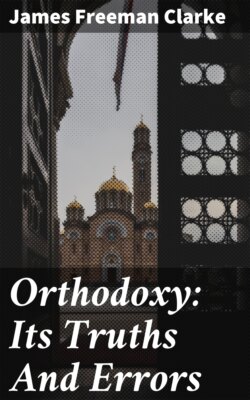Читать книгу Orthodoxy: Its Truths And Errors - James Freeman Clarke - Страница 26
На сайте Литреса книга снята с продажи.
§ 9. No Conflict between Naturalism and Supernaturalism.
ОглавлениеTable of Contents
But between true naturalism and true supernaturalism we do not think there need be any war. We know that there are many men so rooted in their faith in nature, that they cannot see anything outside of it, or beyond it. To them [pg 052] God is law, and law only. Even creation is repugnant to them, because they see that creation is really a supernatural thing. Hence come the theories of development; the “Vestiges of Creation;” the nebular hypothesis; the Darwinian theory of formation of species by natural selection; the notion of man coming out of an ape; pantheistic notions of a God so immersed in nature as to be not its intelligent guide, but only its unconscious soul; the whole universe proceeding according to an order which is just as much above God's knowledge as above ours. Now, the best geologists assure us that there is no evidence in support of the transmutation of species. Mr. Darwin's theory of the formation of species by natural selection is this: In the struggle for life, the strongest and best adapted animal lives, the rest die. This animal transmits to its offspring its own superior qualities; so a higher animal is gradually developed. For example, the giraffe was not made by God with a long neck in order that it might browse on the leaves of high trees. But when leaves were scarce, the animal who happened to have a neck a little longer than the rest was able to get leaves. So he lived, and the rest died. His children had longer necks by the law of hereditary transmission. So, in the course of ages, animals were gradually found with very long necks. Thus the walrus has a curved horn growing downwards from his lower jaw, by which he climbs on to the floating ice. We must not suppose, however, that God gave him the tusk for that purpose; but the walrus, or seal, who happened to have a little horny bone under his chin, could climb on the ice and get his food more easily, and so he lived, while the rest died; and his descendants in the course of a few hundreds of thousands of years came, by repeating this process, to have horns, and so this species of phoca arrived.
It is certainly possible to believe this theory. But in believing it we have to suppose two things; first, a happy [pg 053] accident, and then a law of transmission of hereditary qualities. Now, the theory substitutes this law of transmission and these happy accidents for the creative design. Is anything gained thereby? The domain of law is extended a little. But extend it as much as you will, you must at last come to something above law. Suppose these laws by which walrus and giraffe came, were all in the original nebula, so that no Creator has been needed since, and nothing supernatural—nature has done it all since. But who put the laws there to begin with? You have to take the supernatural at last, or else suppose an accident to begin with. Accidentally, all these wonderful laws happened to be in a particular nebula. He who shrinks from this supposition accepts the supernatural, all at once, at the beginning, instead of the supernatural all the way along, “What does he gain by it?” He gains merely this, that he puts the Creator out of sight; or rather, puts himself out of sight of the Creator. He worships the great god Development instead.
Equally satisfactory to the intellect, to say the least, and much more satisfactory to the best human instincts, is the view of God which sees him coming evermore into nature from above nature. This view says, “God is not only order, but also freedom. He is not only law, but also love. He is in the world as law and order, but he is above the world as thought and love; as Providence, as the heavenly Father. He comes to us to meet our exigencies, to inspire our doubting hearts, to lift us into life and light. He does not set a grand machine going, and then look on and see it work; but he is in the world, and with us always. The supernatural dwells by the side of the natural. Just as a wise and good father has rules and laws by which to govern his children—rewarding and punishing them as they obey or disobey; but besides that, does a thousand things for them, taking the initiative himself; so God governs us by law, but [pg 054] also often takes the initiative, giving us what we never asked for, and knew nothing of.”
